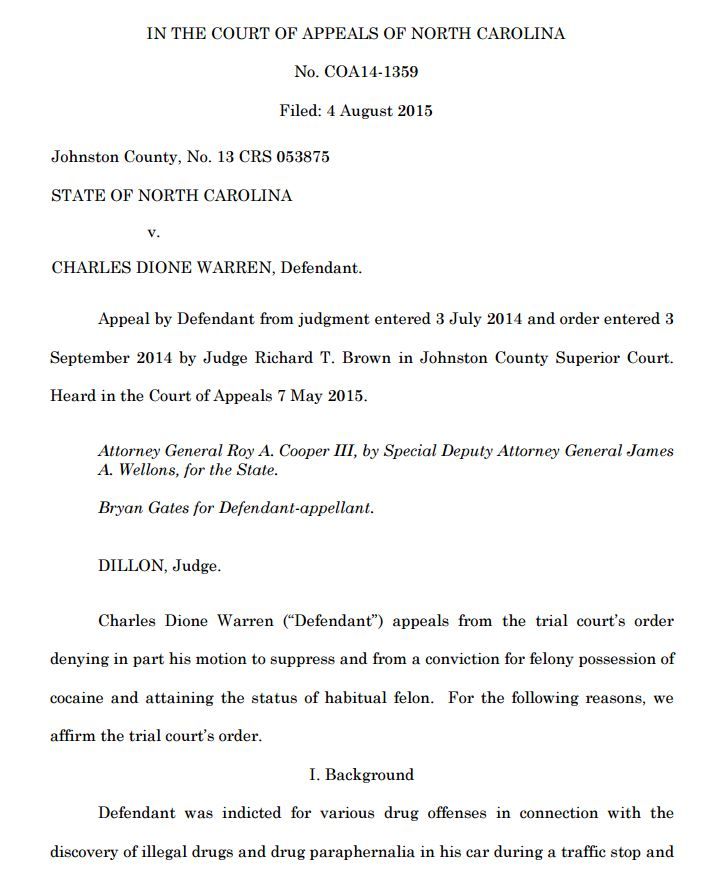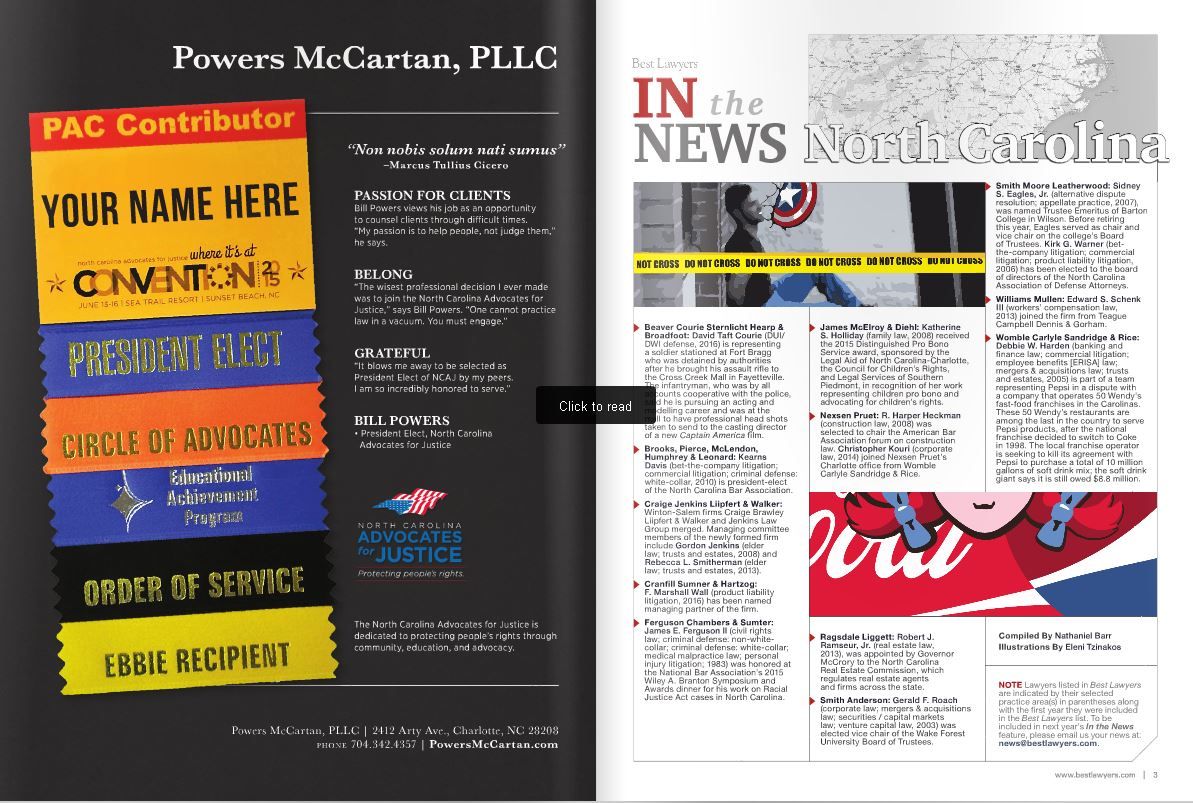By Driving a Car in North Carolina, Do You Consent to a Sniff Search? Is a Sniff even a Search? Does the law differ between Vehicles and Persons?
Caselaw Summary For North Carolina v. Warren
North Carolina Court of Appeals – Publication Date August 4, 2015
Divided Opinion: DILLON, Judge, Judge GEER concurs. Judge ELMORE dissents in a separate opinion
Standard of Review: “Whether competent evidence supports the trial court’s findings of fact and whether the findings of fact support the conclusions of law.” State v. Biber, 365 N.C. 162, 167-68, 712 S.E.2d 874, 878 (2011).
- Unchallenged findings of fact are deemed to be supported by competent evidence and are binding on appeal
- Conclusions of law are reviewed de novo and are subject to full review
- Under a de novo review, the court considers the matter anew and freely substitutes its own judgment for that of the lower tribunal
Majority Ruling:
We believe that based on the trial court’s unchallenged findings, the officer had reasonable suspicion to extend the routine traffic stop to perform a dog stiff; and, accordingly, we hold that the trial court did not err in partially denying Defendant’s motion to suppress.
- Officer may – in addition to writing out a traffic citation – perform checks which “serve the same objective as enforcement of the traffic code[.]”
- Includes checking the driver’s license, determining whether there are outstanding warrants against the driver, and inspecting the automobile’s registration and proof of insurance
- May conduct certain unrelated checks during an otherwise lawful traffic stop
- May not prolong the stop, absent the reasonable suspicion ordinarily demanded
- The performance of a dog sniff is not a type of check which is related to an officer’s traffic mission
- Prior de minimis Rule in North Carolina no longer the law or legal standard
Therefore, under Rodriguez, an officer who lawfully stops a vehicle for a traffic violation but who otherwise does not have reasonable suspicion that any crime is afoot beyond a traffic violation may execute a dog sniff only if the check does not prolong the traffic stop.
Important Point: “Unchallenged Findings” of Fact are deemed true. While the Appellate Court reviews the Conclusions of Law de novo, Counsel must challenge the Findings of Fact or be bound by them.
What is Reasonable in forming a Suspicion?
In determining whether an officer had a reasonable suspicion of criminal activity, the court must examine both the facts known to the officer at the time he decided to approach the defendant and the rational inferences that may be drawn from those facts.
- Reviewing court must take into account an officer’s training and experience
- Court must view the totality of the circumstances through the eyes of a reasonable and cautious police officer at the scene
- Proximity to a “High Crime Area” in itself does not constitute Reasonable Suspicion
- Presence in a High Crime Area, coupled with some sort of evasive behavior, may constitute reasonable suspicion
- Minimal level of objective justification
We hold that based on the totality of the facts the trial court’s unchallenged findings (emphasis added) establish the “minimal level of objective justification” to show that the officer had reasonable suspicion to believe that criminal activity was occurring to justify the extension of the traffic stop.
ELMORE Dissent
Important Quotes:
Because the officer neither questioned defendant about having an item in his mouth nor did he search defendant’s mouth, I find it highly objectionable that the purported evasive conduct that essentially tipped the scale in favor of finding reasonable suspicion was the officer’s mere alleged suspicion that defendant had an unknown object in his mouth. Had the officer taken any steps to confirm his suspicion, a canine search of defendant’s vehicle would debatably have been permissible based upon reasonable suspicion. Egregiously, the officer neglected to investigate his suspicion, yet still felt justified in prolonging the stop to conduct a canine sniff of the outside of defendant’s vehicle. Notably, the officers in I.R.T. and Watson both demanded that the defendants spit out what was hidden in their mouths as part of the investigatory stop.
To me, these facts suggest that the officer was acting on no more than an “unparticularized suspicion or hunch” that defendant’s vehicle contained contraband based on defendant’s presence in a high crime area
The majority contends that “it is unclear from the trial court’s findings whether the execution of the dog sniff prolonged the traffic stop.” I disagree.
. . .[I]n light of the Supreme Court’s holding in Rodriguez, we are no longer bound to follow the de minimis rule.
Do You Consent to a Sniff Search?
By operating a motor vehicle, given the de minimis intrusion of a “Sniff Search,” caselaw indicates law enforcement may utilize canine assistance during a lawful traffic stop without Reasonable Suspicion or Probable Cause of criminal activity being “afoot.” At the same time, law enforcement may not additionally delay the “seizure” of a motor vehicle stop to perform the same without Reasonable Suspicion.
Indeed, the United States Supreme Court has held a drug sniff in-and-of-itself does not constitute a search for Fourth Amendment purposes. Illinois v. Caballes, 543 U.S. 405 (2005), wherein a “sniffing” of the exterior of a car is not a search subject to the Fourth Amendment.
Supreme Court Holding:
‘. . .[T]he use of a well-trained narcotics-detection dog–one that “does not expose noncontraband items that otherwise would remain hidden from public view,’ Place, 462 U.S., at 707–during a lawful traffic stop, generally does not implicate legitimate privacy interests. In this case, the dog sniff was performed on the exterior of respondent’s car while he was lawfully seized for a traffic violation. Any intrusion on respondent’s privacy expectations does not rise to the level of a constitutionally cognizable infringement.
Is a Sniff Search Different for a Person, Rather than a Vehicle?
In his treatise on Criminal Law, Professor Arnold H. Loewy opines, “The very act of being subjected to a body sniff by a German Shepherd may be offensive at best or harrowing at worst to the innocent sniffee.” Arnold H. Loewy, The Fourth Amendment As A Device for Protecting the Innocent, 81 Mich. L. Rev. 1229, 1246-47 (1983).
Odors themselves do not appear to be an interest to be protected, especially when it pertains to possession of a contraband substance. Put simply, one cannot seek to defend an interest in something that is per se illegal to possess.
The line of demarcation is more likely related to the protection of the person and the intrusion of any search to the body or personal space of that person.
As Professor Loewy implies, some people are simply afraid of dogs. Clearly there remains some room for argument, as is always the case in the law, where the mere presence and “alerting” of a dog in certain public places could be permissible.
One could reasonably ask, “Does the breed and method of sniffing make a difference? Is a Beagle less intrusive than a German Shepherd?”
SEE ALSO: GEORGETOWN LAW JOURNAL
Bill Powers
2412 Arty Avenue
Charlotte, North Carolina 28208
704-342-4357
https://www.carolinaattorneys.com/
bill@PowMac.com
Helpful Information About Criminal Charges
 Carolina Criminal Defense & DUI Lawyer Updates
Carolina Criminal Defense & DUI Lawyer Updates

